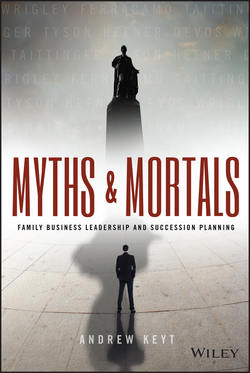Читать книгу Myths and Mortals - Keyt Andrew - Страница 12
На сайте Литреса книга снята с продажи.
Prologue: Born in the Shadows
Moving the Past into the Future
ОглавлениеIf a successor fails to differentiate, the family business most often fails to move its legacy forward. A differentiated leader is able to cast a vision that others can rally around simply because it is a vision that she can take charge of. Guided by her own rudder of conviction as well as her unique talents, interests, and experiences, she casts a unique vision for the time in which she is called to lead. A compelling vision, including shared values, is a motivational force. Values make people stay; a vision gets them going; and the meaning generated motivates people to pursue a larger purpose. It ignites a community and changes its culture. This is what Bill Wrigley did at his family retreat in Lake Geneva with his global leadership team, shortly after his father's passing in 1999. Bill aspired to create a new culture that encouraged the behavior he was looking for from his leadership team and, by extension, all the employees of Wrigley. In doing so, he worked with his team to set the company on a new growth trajectory.
This became apparent the night he gathered 60 leaders from around the world to a company pow-wow. Every element of the meeting was a departure from the past. “We had everyone exercising at 7 a.m., “he says,” and eating foods they had never seen on a plate. We had a session on listening, another on developing healthy company gossip, and at the end of every evening – and keep in mind this was 10 o'clock at night – we passed around a talking stick and participants reflected on the day.” One of the outcomes was a clearer recognition of how each member of the leadership was responding to the change. A player was fully engaged and exploding with energy, a passenger was curious but reluctant. The challenge was to turn the passenger into a player. The prisoners were the leaders who sat with their hands folded across their chests. These were “not the kind of people we wanted for the company we were building,” says Bill Jr.
For the crowning moment of the Lake Geneva leadership summit, he took an old concept and gave it a new meaning. “I wanted to build a microcosm of how this company should work worldwide, and I wanted to do it without flying around the world, as my father had.”
Bill told all 60 leaders to break out by their geographical regions and to discuss fresh ideas for the company. Earlier in the week, the entire group had compiled a list of things that were wrong with the company. “Wipe the slate clean of all that excess baggage,” Bill said, “and take your ideas and go pollinate other groups with them.”
In a simple exercise, Bill had democratized the pollination process.
What his dad had done solo, the corporate leadership was doing as a team. The hierarchy of command-and-control had become a hive of cooperation and cross-pollination. When the buzz subsided, an incredulous participant asked a question that harkened back to the old days: “Who's going to approve all these plans?”
Bill took a few moments to absorb the question, with all its implications. Then he replied, “This is our plan. They are all approved. Let's go out and get it done.” The room erupted with cheers. A new era had begun at Wrigley
Just as the bout of nausea in a London flat had been a pivotal personal crisis for Bill, when his gut told him that he had to change, the Lake Geneva pollination session was a turning point for the entire Wrigley organization. “That night, some of the old guard decided to leave,” Bill Jr. says.
And those who stayed followed him into the future.
